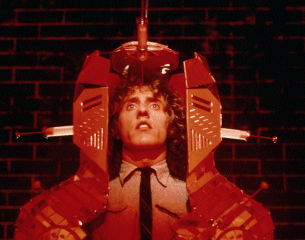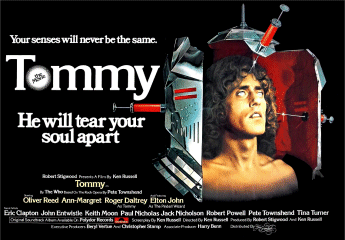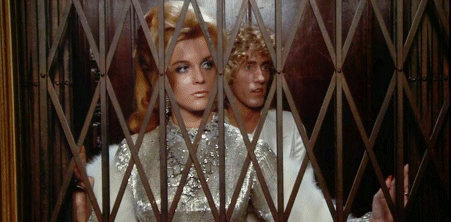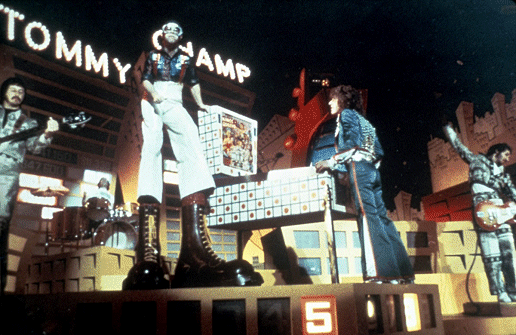Sixties
City presents
a wide-ranging series of
articles on all aspects of the Sixties, penned by the creator of the iconic
60s music paper Mersey
Beat
|
Sixties
City presents
a wide-ranging series of
articles on all aspects of the Sixties, penned by the creator of the iconic
60s music paper Mersey
Beat
|
|||||
|
| Cult director
Ken Russell's controversial movie version of The Who's 1969 double-album
rock opera 'Tommy', produced by Robert Stigwood. Ken Russell also penned
the screenplay, with additional material from Pete Townshend and John Entwistle.
The Columbia film features Roger Daltrey as Tommy Walker, Ann-Margret as
Nola Walker Hobbs, Oliver Reed as Frank Hobbs, Keith Moon as Uncle Ernie,
Paul Nicholas as Cousin Kevin, Jack Nicholson as The Specialist, Tina Turner
as the Acid Queen, Elton John as the Pinball Wizard, Eric Clapton as the
High Priest and Robert Powell as Captain Walker. The story on the 'Tommy'
album was originally set in an earlier period when Tommy's father is allegedly
killed in World War I, but returns in 1921 and kills his wife's lover. This
was changed for the film which now begins in World War II and it is the
Captain rather than the lover who is murdered. The film begins when Newlywed Nora Walker learns that her pilot husband Captain Walker has been shot down on a bombing mission. She gives birth to her son Tommy on Victory Day and later moves to live in the holiday camp run by her rascally cousin Frank Hobbs. The couple get married. The naked couple are wakened in their bed one night when a scarred Walker turns up. He didn't die in the crash and a fight ensues during which Frank kills Walker, witnessed by the ten year-old boy Tommy. Nora and Frank turn on Tommy screaming to him in song 'You didn't see it! You didn't hear it! You won't say nothing to no one ever in your life!' The boy takes it literally and becomes psychosomatically deaf, dumb and blind. Over the years Nora seeks to cure him by taking him to a number of weird cultists including a Marilyn Monroe cult. She even takes him to see the Acid Queen who pumps him full of drugs. Two perverted relatives also abuse the boy, Cousin Kevin with physical torture and Uncle Ernie with sexual abuse. Tommy discovers a working pinball machine in a junkyard and finds he has a talent for the game. He challenges the Pinball Wizard, beats him and becomes the world pinball champion. He recovers his senses and becomes the object of cult worship. |

 |
 |
Director
Russell employs some unusual visuals in the film - notably a scene in which
Ann-Margret squirms in a flood of baked beans and chocolate which come pouring
out of a television set; giant Marilyn Monroe figures based on the skirt-raising
scene in 'The Seven Year Itch'; Elton John as the Pinball Wizard in a pair
of colossal shoes and 'Acid Queen' Tina Turner strapping Tommy into an iron
maiden-style device to inject him full of drugs. Some prints of the film
were released at selected cinemas with a multi-track hi-fi soundtrack which
was labelled 'quintaphonic sound'. 'Tommy' was nominated for two Oscars:
Ann-Margret in the Best Actress category and Pete Townshend for Best Music.
Ann-Margret also won the Golden Globe Award as Best Actress for her part
in the film. The soundtrack album included two additional numbers written
for the film - 'Bernie's Holiday Camp' and 'Champagne', the latter specially
written for Ann-Margret The film soundtrack was a double album: Disc One: Overture for 'Tommy', The Who; Prologue 1945, Pete Townshend/John Entwhistle; Captain Walker/It's A Boy, Pete Townshend; Bernie's Holiday Camp, The Who; 1951/What About the Boy, Ann-Margret/Oliver Reed; Amazing Journey, Pete Townshend; Christmas, Ann-Margret/Oliver Reed/Alison Dowling; Eyesight To The Blind, Eric Clapton; Acid Queen, Tina Turner; Do You Think It's Alright, Ann-Margret, Oliver Reed. Disc Two: Champagne, The Who/Ann-Margret/Oliver Reed; There's A Doctor, Ann-Margret; Go To The Mirror, Ann-Margret/Oliver Reed/Jack Nicholson/Roger Daltrey; Tommy Can You Hear Me, Ann-Margret; Smash The Mirror, Ann-Margret; I'm Free, Roger Daltrey; Mother and Son, Pete Townshend; Sensation, Roger Daltrey; Miracle Cure, Simon Townshend; Sally Simpson, Pete Townshend/Roger Daltrey. |
| Originally,
Pete Townshend wanted Tiny Tim for the part of the Acid Queen, but it was
Robert Stigwood who insisted on Tina Turner. He also offered Stevie Wonder
the part of the Pinball Wizard but was turned down. Ann-Margret filled some
of the rock artists with adolescent-style passion. Keith Moon described
her to the press as 'a lovely girl with bit tits' while Eric Clapton spent
an entire night banging on her hotel bedroom door shouting "I'm yours Ann-Margret.
I love you". Ann-Margret recalls, "Keith was so loose. He once slipped a
diamond ring off his finger and gave it to me simply because I admired it".
Actually, Ann-Margret is rather accident prone and was taken to hospital following her breakdown in the 'Champagne' scene, during which she throws a champagne bottle at the television set. The initial rush of foam from the set, blown through a special tunnel, completely knocked her back. As she crawled forward she didn't realise how close she was to the smashed television set and cut her arm on the jagged glass. She completed the scene, being completely enveloped in baked beans and chocolate. A blanket was wrapped round her and she was rushed to hospital, caked in the materials, her make-up running and was attended by an Indian doctor who could speak little English, but made no comment on her bizarre appearance as he put 27 stitches into her arm. She still bears the scar today. There is no actual dialogue in the film as all the parts are sung, as in an opera. The recordings were made prior to the filming. There was no problem with Ann-Margret, a professional vocalist, but Townshend was unsure about the casting of Jack Nicholson, although he was pleased and surprised to discover the actor could sing. The same couldn't be said for Oliver Reed, who had to record his part literally a line or a word at a time so that they could be cut together. The film was originally budgeted at £1m but after eighteen weeks of shooting the final bill came to £3.5m 'Tommy' was premiered at the Ziegfeld Theatre in New York on 18th March 1975 and there was a celebration party after the screening at the 57th Street subway station. Producer Robert Stigwood had transformed the three-block long area with trees, fauna and flowers. There were six hundred guests and a thousand people gathered outside to watch the stars arrive. The West Coast premiere took place the next day at Mann's Chinese Theatre in Los Angeles. The European premiere was staged at Leicester Square Theatre, London on 26th March. The last word must go to director Russell, who was to comment, " 'Tommy' is greater than any painting, opera, piece of music, ballet, dramatic work or what you will, of this century. Audiences, especially young audiences, reach out for it and feel better after hearing it or seeing it performed. They grow taller after it, it changes them for the better, it communicates with people of all ages. Every art form should communicate, of course, but 'Tommy' communicates deeply, more deeply than anything else I know". |

|
|
Article
Text
|